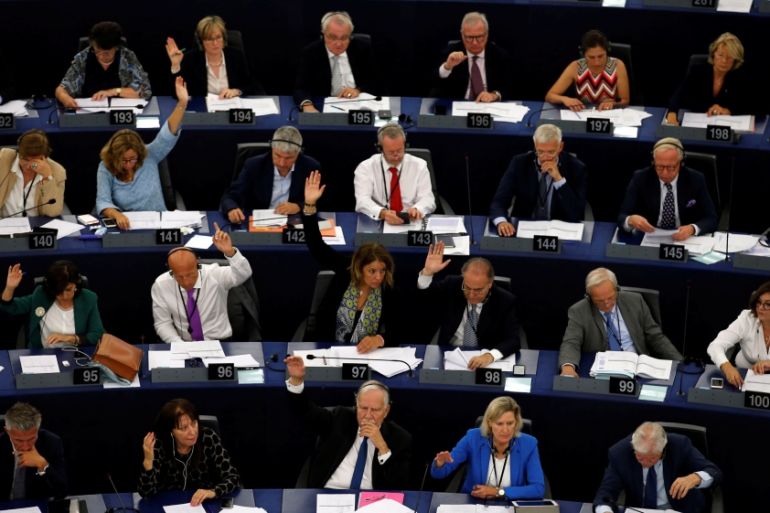EU legislators say ‘yes’ to disciplinary action against Hungary
MEPs vote 448 to 197 to start punitive procedures against Hungary for moves against EU’s ‘democratic values’.

European Union legislators voted overwhelmingly in favour of launching punitive action against the Hungarian government for flouting democratic rules in a stunning political blow for Prime Minister Viktor Orban.
With 448 votes in favour, 197 against and 48 abstentions, the motion passed in the plenary session on Wednesday, the first time ever the European legislature triggered an Article 7 procedure against an EU member state.
Keep reading
list of 4 itemsAgadez, Niger’s gateway to the Sahara, finds new life in the migrant trade
Forced from home, these Colombians struggle to live in a basketball stadium
UN says 38 dead, including children, as migrant boat sinks off Djibouti
The unprecedented vote could allow Hungary’s EU voting rights to be stripped.
Dutch Greens MEP Judith Sargentini, who spearheaded the vote, smiled broadly and breathed a sigh of relief before embracing her supporters in parliament in the French city of Strasbourg.
“It is a positive sign of this parliament taking responsibility and wanting action,” Sargentini told a press conference afterward.
She had urged colleagues not to let Hungary off the hook, declaring that Orban’s rule “violates the values on which this union was built”.
EU Commission President Jean-Claude Juncker said before the vote that the commission “will resist all attacks on the rule of law” in an annual state-of-the-union speech in the European Parliament.
Juncker went on to say the commission, which proposes EU legislation and oversees implementation of decisions, “continues to be very concerned by the developments” in some EU member states and promised to employ the rule-of-law procedure against any governments that veer from the EU’s democratic principles.
EU ‘blackmail’
Hungarian Foreign Minister Peter Szijjarto wasted little time in slamming the vote as “nothing less than the petty revenge of pro-immigration politicians”.
“This decision condemning Hungary and the Hungarian people was made because we Hungarians have demonstrated that migration in not a necessary process and that migration can be stopped,” Szijjarto told reporters in Budapest.
|
|
Since sweeping to power in 2010, Orban has pressured courts, media, and non-governmental groups, as well as refusing to take in asylum seekers arriving in Europe.
Though the EU has often protested, it largely failed to stop what his critics decry as Orban’s growing authoritarianism.
But a surge in support for nationalist and populist politicians across the bloc galvanised a stronger reaction. Speaking in front of the assembly on Tuesday, Orban said he would not bow to the EU’s “blackmail” and stick to his policies.
Refugee stance
The vote was hailed as “historic” by Berber Biala-Hettinga, Amnesty International’s expert on human rights in the EU.
“The European Parliament rightly stood up for the Hungarian people and for the EU. They made it clear that human rights, the rule of law and democratic values are not up for negotiation,” she said.
In June, Hungary’s parliament overwhelmingly passed a law imposing jail terms for anybody seen to be aiding undocumented immigrants.
The law targets rights groups and NGOs and allows banning of organisations.
In addition to the bill, the parliament also passed a constitutional amendment stating an “alien population” cannot be settled in Hungary.
Szijjarto said Hungary was considering legal options to appeal the result because of the way the vote was tallied.
He also claimed the vote involved “massive fraud” since abstentions weren’t counted into the final tally, which made it easier to reach the needed two-thirds majority.
|
|
‘Afraid of foreigners’
Uli Brueckner, a professor of European studies at Stanford University in Berlin, told Al Jazeera the vote was made because of Hungary’s “misfunctioning democracy”.
“In a populous agenda, it is always useful to play the blame-game, and the blame-game here is ‘we are afraid of foreigners’. It is always useful to play a blame-game. It instrumentalises people’s fears,” Brueckner said of the government’s policies.
Aside from its anti-immigrant stance, Orban’s government is also accused of silencing independent media and academia, removing independent judges, cracking down on organisations helping homeless people, migrants or disadvantaged groups, such as Roma, and condoning government corruption.
The vote means the other EU states must now look at what to do with Hungary.
The most severe punishment under the Article 7 procedure is stripping Hungary of its voting rights in the EU. However, that move is highly unlikely as the rest of the EU needs unanimity.
Poland‘s nationalist and anti-immigration government – against which the EU Commission has slowly enacted Article 7 procedures over the last two years over concerns about the independence of its judiciary – is expected to block any tough action against Orban.
“Poland is very worried by the decision taken by parliament today,” Joanna Kopcinska, spokeswoman for Poland’s ruling Law and Justice party, told AFP news agency.
Kopcinska said the vote threatens the EU’s unity. “It is necessary to resolve such disputes through dialogue and not diktat,” she said.